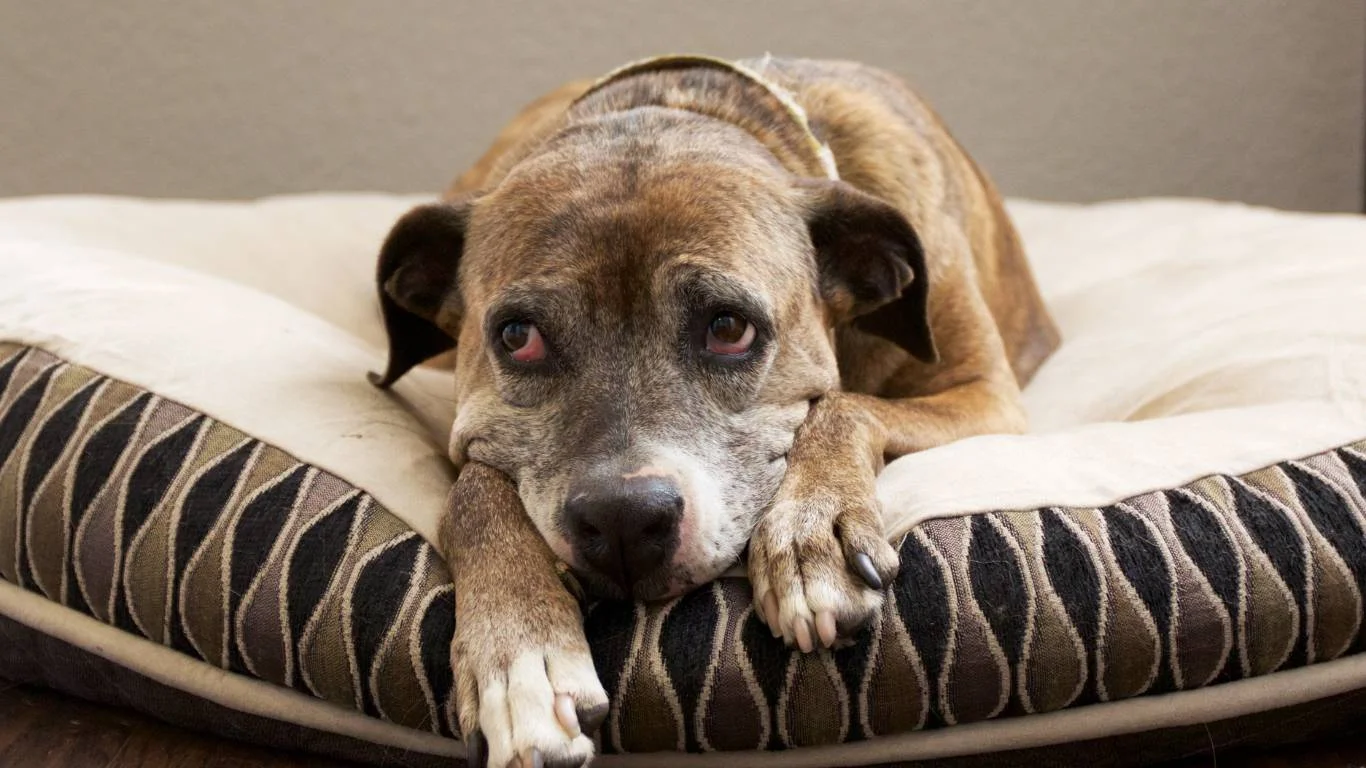Best Ways to Treat a Dog with a Sore Throat: Quick Relief Tips
As a Veterinary Assistant with a focus on nutrition, I’ve seen my fair share of dogs with sore throats. Whether it’s due to an upper respiratory infection, excessive barking, or even just environmental irritants, a dog with a sore throat can be miserable. The good news is that there are plenty of ways to treat a dog with a sore throat and help them feel better. In this guide, I’ll walk you through the best ways to treat a dog with a sore throat, offering practical advice, home remedies, and tips based on my experience working with dogs in a clinical setting.
Recognizing the Signs of a Sore Throat in Dogs

Before diving into treatment, it’s important to know how to identify when your dog has a sore throat. Dogs can’t exactly tell us when they’re feeling under the weather, so it’s up to us as pet owners to watch for the signs. A sore throat in dogs often presents itself with a few noticeable symptoms:
- Coughing: If your dog has a persistent, dry cough, it could be a sign that they’re dealing with a sore throat or throat infection.
- Difficulty Swallowing: If your dog seems to struggle when eating or drinking, or avoids their food, it’s likely that their throat is causing them discomfort.
- Gagging or Drooling: Excessive drooling or gagging can also be an indicator of throat irritation or infection.
- Reduced Appetite: A dog with a sore throat might lose interest in food, particularly if chewing or swallowing is painful for them.
- Change in Voice: If your dog suddenly sounds hoarse or their bark changes, this could be a clear sign of throat issues.
If you notice any of these signs, it’s important to take action right away. While some throat issues can resolve themselves with time and proper care, others may require veterinary intervention.
Best Ways to Treat a Dog with a Sore Throat

So, how can you treat a dog with a sore throat? There are several approaches you can take, depending on the severity of the symptoms and what might be causing the throat pain. Here are the best methods I recommend based on my experience working with dogs:
1. Keep Them Hydrated
One of the first things you should focus on when treating a dog with a sore throat is keeping them hydrated. A sore throat can be exacerbated by dehydration, and it can also make swallowing more difficult. Make sure your dog always has access to fresh, clean water. If they’re hesitant to drink on their own, try offering ice cubes or ice chips—some dogs find this easier to consume when they’re not feeling well. You can also try a hydration supplement, which can help soothe the throat while encouraging your dog to drink.
2. Offer Soft Foods or Warm Broth
If your dog’s throat is sore and they’re having trouble eating, try offering softer foods that are easier to swallow. Warm, bland options like chicken broth, mashed potatoes, or boiled chicken are gentle on a sore throat and won’t cause further irritation. Just make sure the broth doesn’t contain any onions, garlic, or other harmful ingredients that can make your dog sick.
In my experience, dogs tend to feel better after a few bites of warm, comforting food. It’s soothing and provides them with the energy they need to recover. If your dog is particularly picky, you can also try mixing a bit of wet dog food with warm water to create a soft, easily-consumed meal.
3. Use a Humidifier
Dry air can make throat discomfort worse for dogs, just like it can for us. To help your dog breathe easier and keep their throat moist, consider using a humidifier in the room where your dog spends most of their time. The added moisture in the air can soothe an irritated throat and help relieve some of the discomfort your dog may be feeling.
I’ve seen many dogs benefit from this simple and natural solution. You don’t have to go overboard with a high-tech humidifier; even a basic one can help improve the air quality and ease your dog’s throat pain.
4. Keep Your Dog Calm
While it’s important to treat the physical symptoms of a sore throat, don’t forget the emotional well-being of your dog. Stress and anxiety can worsen physical symptoms, so it’s important to keep your dog calm and comfortable. Limit their physical activity, avoid loud noises, and try to keep their environment peaceful.
If your dog is prone to barking, be mindful of how much they’re using their voice. Excessive barking can worsen throat pain, so encourage them to rest and relax as much as possible. Play calming music or provide a cozy spot where they can unwind without being disturbed.
5. Natural Remedies and Herbal Options
If you’re looking for a natural way to help treat your dog’s sore throat, there are a few herbal remedies that may be worth exploring. Some herbs, such as slippery elm or marshmallow root, are known for their soothing properties and may help relieve throat irritation. However, it’s essential to consult with a vet before introducing any new supplements or herbs to your dog’s diet, as some can interact with medications or cause adverse effects.
In my practice, I’ve found that these natural remedies can work wonders when paired with traditional treatments. But remember, always check with your vet before giving your dog any kind of supplement, especially if they’re already on other medications.
When to See the Vet

While many cases of sore throats in dogs can be treated at home, it’s important to know when to seek professional help. If your dog’s symptoms worsen, or if they develop a fever, have trouble breathing, or show signs of distress, it’s time to visit the vet. A sore throat could be a symptom of a more serious condition, such as an infection, a foreign object stuck in the throat, or even an underlying disease.
As someone who has worked with dogs in clinical settings, I can’t stress enough how important it is to listen to your pet. If you feel like something’s not right, don’t hesitate to reach out to your vet for guidance. It’s always better to be safe than sorry when it comes to your dog’s health.
Medications and Treatments for a Dog’s Sore Throat

When it comes to treating a sore throat in dogs, there are times when home remedies and soothing practices just aren’t enough, and your pup may need some extra help. That’s where medications come in. As a Veterinary Assistant, I’ve seen first-hand how medications can provide relief to dogs who are struggling with more severe throat irritation or underlying health issues. If your dog’s symptoms don’t improve after a few days of at-home treatment, it might be time to speak with your vet about prescription medications or other treatments. Here’s what to consider:
1. Pain Relievers and Anti-Inflammatories
If your dog’s sore throat is causing significant discomfort, your vet might recommend pain relief medications or anti-inflammatories. These can help reduce the swelling and soothe the pain, making it easier for your dog to eat, drink, and breathe more comfortably. Common medications for this purpose include nonsteroidal anti-inflammatory drugs (NSAIDs), which are often prescribed for pain management in dogs.
While over-the-counter pain relievers for humans (like ibuprofen or acetaminophen) might seem tempting, they are extremely dangerous for dogs and should never be used without a vet’s approval. Always consult your veterinarian for the safest and most effective medication options for your furry friend.
2. Antibiotics for Infections
If your dog’s sore throat is caused by a bacterial infection, antibiotics might be necessary to clear it up. It’s essential to understand that not all sore throats are due to bacterial infections—many are viral, in which case antibiotics won’t help. That said, bacterial infections can occur in the throat, especially if your dog has other underlying conditions like kennel cough or upper respiratory infections.
During my time as a veterinary assistant, I’ve seen dogs who needed antibiotics to treat bacterial infections in the throat, which were often a result of other respiratory issues. A quick diagnosis from your vet will ensure that your dog receives the right treatment. Never administer antibiotics without professional guidance, as misuse can lead to antibiotic resistance.
3. Cough Suppressants
If your dog’s sore throat is accompanied by persistent coughing, a vet may prescribe cough suppressants or expectorants. These medications help reduce coughing and soothe the throat, preventing further irritation. Cough suppressants can help your dog rest more comfortably, but it’s essential to address the underlying cause of the cough—whether it’s a viral infection, allergies, or something else.
In my experience, cough suppressants can work wonders in providing temporary relief, especially for dogs who are struggling to sleep or rest due to constant coughing. But remember, always follow your vet’s advice on how to administer them properly.
4. Steroids for Severe Inflammation
In cases of extreme inflammation in the throat—like in some viral infections or immune-mediated diseases—your vet may prescribe corticosteroids to help reduce swelling and promote healing. Steroids are powerful medications and are usually given when the throat irritation is significant enough to affect your dog’s ability to eat, drink, or breathe comfortably.
While steroids are effective, they do come with potential side effects, so they should only be used under strict veterinary supervision. As with all medications, your vet will guide you on the correct dosage and duration of use to ensure your dog’s health and well-being.
Environmental Adjustments to Help Soothe Your Dog’s Throat

Sometimes, the best way to treat a dog’s sore throat isn’t through medications—it’s through making their environment as soothing and comfortable as possible. Dogs are highly sensitive to their surroundings, and the right environment can speed up their recovery process. Here are a few tips that I’ve found helpful over the years:
1. Create a Quiet, Relaxing Space
If your dog is dealing with a sore throat, it’s important to minimize stress. This means creating a quiet, peaceful space where they can rest and recover. Loud noises, excessive excitement, and physical activity can all make a sore throat worse.
I’ve found that dogs with sore throats tend to respond well to a calm environment. Consider setting up a cozy spot with their favorite bed, blanket, or even a crate that feels safe and secure. Keep the area free of distractions, and let your dog rest as much as possible. You can even try playing soft, calming music to help them relax.
2. Avoid Exposure to Smoke or Strong Odors
Smoke, strong perfumes, cleaning chemicals, and even certain foods can all irritate a dog’s throat. If your dog is already struggling with a sore throat, exposure to these irritants can make their condition worse. Be mindful of your dog’s environment, and try to keep them away from smoke-filled areas, including rooms where people are smoking or grilling outside.
As a pet owner, you may not always think about how these environmental factors can affect your dog’s health. However, I’ve learned over the years that dogs with respiratory or throat issues can be very sensitive to these odors, so it’s worth taking extra care to keep their environment as clean and allergen-free as possible.
3. Keep Your Dog Away from Cold Drafts
Cold air and drafts can aggravate a sore throat, just like they can make us feel worse when we’re under the weather. If it’s chilly outside, or if you have air conditioning running indoors, make sure your dog is kept warm and comfortable. You can even wrap them in a cozy blanket if they seem chilled or shivery. Heat pads are also a good idea if they’re spending time resting on hard surfaces like tile or hardwood floors.
In my experience, many dogs feel a lot better when they’re in a warm, comfortable environment. So, make sure to monitor your dog’s comfort level and adjust the temperature accordingly.
When to Seek Veterinary Attention for a Dog’s Sore Throat

While home remedies, medications, and environmental adjustments can help most dogs with sore throats, there are times when professional intervention is necessary. Here are a few scenarios where you should reach out to your vet for further evaluation:
- If your dog’s sore throat lasts longer than a few days without improvement.
- If your dog develops a fever or shows signs of severe pain or distress.
- If your dog is having difficulty breathing, which could indicate a more serious issue like a throat obstruction or infection.
- If your dog is refusing to eat or drink for an extended period of time, which could lead to dehydration.
- If your dog shows signs of vomiting, gagging, or severe coughing that doesn’t improve.
As much as we wish we could always fix our dogs’ problems with a little TLC, sometimes the cause of their sore throat is more complicated than it seems. Don’t hesitate to contact your vet if you have concerns—early intervention can help prevent complications and ensure your dog gets the best possible care.
Preventing Sore Throats in Dogs

While it’s important to know how to treat a dog with a sore throat, it’s even better to focus on prevention! As a veterinary assistant, I’ve always emphasized how crucial it is to keep our dogs as healthy as possible. Preventing a sore throat means avoiding common causes of throat irritation and boosting your dog’s overall health. Here are some simple steps you can take to keep your dog’s throat—and their entire respiratory system—healthy:
1. Regular Vaccinations
One of the best ways to prevent respiratory infections that could lead to a sore throat is by staying up to date with your dog’s vaccinations. Vaccines like the Bordetella vaccine (often required for kennel stays) can help protect your dog from kennel cough, a common condition that can irritate the throat and lead to coughing, discomfort, and difficulty swallowing.
Over the years, I’ve seen many dogs benefit from regular vaccinations. Even if your dog doesn’t visit a kennel or dog park, these vaccines can protect them from airborne infections that can travel through the environment. Make sure to keep up with your vet’s recommended vaccination schedule for your dog’s age, breed, and health status.
2. Avoid Exposure to Irritants
As mentioned earlier, environmental irritants like smoke, cleaning chemicals, and even strong perfumes can contribute to throat irritation. Try to keep your dog away from areas where these irritants are present. For example, avoid smoking around your dog, and make sure to use pet-safe cleaning supplies around the house.
I’ve seen some dogs that are more sensitive to these irritants than others, and they develop throat problems fairly quickly. It’s essential to create a clean, safe space for your dog to thrive, especially if you know that they have respiratory sensitivities. Small changes can go a long way in keeping your dog’s throat happy and healthy!
3. Limit Excessive Barking
Excessive barking can be a significant cause of throat irritation in dogs. If your dog is barking excessively, whether due to anxiety, excitement, or boredom, it’s important to find ways to curb the behavior. Not only can constant barking lead to vocal strain, but it can also exacerbate existing throat issues.
In my practice, I’ve worked with many owners to help reduce excessive barking by increasing mental stimulation, providing more physical exercise, and sometimes even using training techniques like positive reinforcement to redirect barking behavior. If you know your dog is a chronic barker, consider working with a professional dog trainer to address the issue before it leads to more serious throat problems.
4. Maintain a Healthy Diet and Weight
Nutrition plays a huge role in your dog’s overall health, including the health of their throat. Feeding your dog a balanced, nutrient-rich diet will help boost their immune system, which is vital in preventing infections that could cause throat issues. Obesity can also put added pressure on your dog’s respiratory system, which can lead to problems with their throat or lungs.
As someone who has worked closely with dog nutrition, I recommend high-quality dog food that is tailored to your dog’s age, size, and activity level. If you’re unsure about what to feed your dog or have concerns about their weight, don’t hesitate to consult with a vet or a pet nutritionist. Keeping your dog in optimal health is the best way to prevent many health issues, including sore throats.
What to Do If Your Dog’s Sore Throat Becomes Chronic

In some cases, a dog’s sore throat can become a chronic problem. If your dog experiences frequent or recurring throat issues, it’s important to get to the root cause. There could be an underlying condition that’s contributing to their symptoms, such as:
- Allergies: Dogs with allergies are more prone to throat irritation. Dust, pollen, and even certain foods can trigger allergic reactions that lead to throat discomfort.
- Chronic Respiratory Infections: Some dogs are more susceptible to upper respiratory infections that can lead to persistent throat problems. Regular check-ups with your vet can help catch these early.
- Throat Cancer: Though rare, throat cancer can cause persistent sore throats in dogs. If your dog’s symptoms are ongoing and don’t respond to typical treatments, your vet may want to run additional tests.
Chronic sore throats in dogs should never be ignored. If your dog’s throat issues don’t resolve after following the basic treatment methods or if they return frequently, it’s essential to work with your veterinarian to explore further diagnostic testing. Your vet may recommend X-rays, blood tests, or even a biopsy to get to the bottom of the issue.
References
For more information on common dog health issues and treatments, I recommend checking out the following trusted sources:
- American Kennel Club (AKC)
- Vetstreet – Trusted Pet Health Information
- PetMD – Veterinary Advice and Articles
Disclaimer
While this article provides helpful information based on my experience as a Veterinary Assistant, it should not be substituted for professional veterinary advice. Always consult with your veterinarian before administering any medications or treatments to your dog. Each dog’s health situation is unique, and your vet is the best person to guide you in making the right choices for your pet’s care. The advice in this article is meant to support your understanding and to provide general guidelines. Please seek professional veterinary assistance for serious or prolonged symptoms.






